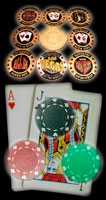Counting Your Outs
An “out ” is a card that will improve your currently losing hand into a winning hand.
If you’re got A ![]() K
K ![]() and the flop comes 9
and the flop comes 9 ![]() 7
7 ![]() 5
5 ![]() , then any Heart is an out for you.
, then any Heart is an out for you.
It’s possible that any Ace or King will also win for you.
So you’ve got between nine and fifteen outs. We aren’t sure exactly how many because we only want to count a card as an out if we are sure it will give us a win.
We’re pretty sure a flush will win, although 9 ![]() might give someone a full hous or 6
might give someone a full hous or 6 ![]() followed by 6
followed by 6 ![]() may also. We aren’t sure at all that making a pair of Aces or Kings will give us a winner.
may also. We aren’t sure at all that making a pair of Aces or Kings will give us a winner.
In counting your outs, should you consider this a hand with nine outs? Or one with fifteen outs? Or even one with eight outs (the 9 ![]() might not make your hand a winner) ?
might not make your hand a winner) ?
The answer depends primarily on how many active opponents there are.
The fewer opponents, the less likely a card that helps your hand will help someone else’s even more.
However, the effect of this is much smaller than most players think.
Still considering the A ![]() K
K ![]() starting hand, let’s look at our outs with the flop J
starting hand, let’s look at our outs with the flop J ![]() 10
10 ![]() 7
7![]() .
.
Any Queen makes us a nut straight, with the exception of the Q ![]() , which may make someone else a flush.
, which may make someone else a flush.
Likewise, if we pair either of our cards, it makes us the top pair, but might make someone else a straight.
So, we have three cards that make us the winning hand and seven cards that improve our hand but may improve someone else’s hand even more.
How many outs do we have? Three outs to win and ten outs to improve, but will just an improvement be enough to win? Take a look at the table and see.
With both the flops, the A ![]() K
K ![]() has one characteristic that adds significant value.
has one characteristic that adds significant value.
It’s that the hand might actually be the best hand right now, without improvement.
This is actually more likely with the 9 ![]() 7
7 ![]() 5
5 ![]() flop than with the flop of J
flop than with the flop of J ![]() 10
10 ![]() 7
7 ![]() .
.
This isn’t obvious to most players.
Most weak players would immediately be concerned that someone has flopped a straight with either flop, but that’s generally unlikely.
The biggest concern should be that someone has flopped a pair and has an Ace or King kicker.
It is much more likely that someone is playing a K ![]() 10
10 ![]() than someone is playing
than someone is playing
a K ![]() 7
7 ![]() .
.
Even most very loose players won’t call a raise pre-flop with a hand like K ![]() 7
7 ![]() .
.
OUTS AND WIN PROBABILITIES BY FIELD SIZE FOR
SELECTED HANDS AND FLOPS
Hand |
||||||
Odds* |
No of opponents seeing |
A |
A |
10 |
10 |
10 |
Flop |
||||||
9 |
J |
7 |
5 |
7 |
||
1-1 |
1 |
.77 |
.56 |
|||
2-1 |
2 |
.65 |
.40 |
.25± |
.50 |
.29± |
3-1 |
3 |
.55 |
.31 |
.19± |
.45 |
.25± |
4-1 |
4 |
.49 |
.25 |
.16± |
.43 |
.21± |
5-1 |
5 |
.46 |
.23 |
.15± |
.40 |
.21± |
6-1 |
6 |
.44 |
.22 |
.13± |
.35 |
.20± |
7-1 |
7 |
.42 |
.20 |
.12± |
.33 |
.19± |
8-1 |
8 |
.41 |
.19 |
.11± |
.32 |
|
9-1 |
9 |
.39 |
.18 |
.10± |
||
Pick the Right Table / Picking a Seat / Theories of Poker / Betting Theory: The Odds
A Theory of Starting Hand Value
A Theory of Flop Play: Counting Outs and Evaluating Draws
The Dynamics of Game Conditions / Table Image / Player Stereotypes
Women and Poker / Spread-Limit Games / Double Bet on the End Games / Kill Games
Short-handed Games / Tournaments / No-limit and Pot-Limit Poker



